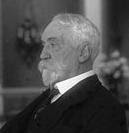 |
| Lord d'Abernon |
Ron Paul (R-TX) has a bestseller, "End the Fed," in which he calls for a return to the gold standard as the surest prevention of inflation. Although he hasn't won many converts among economists, he has sold a lot of books. Besides Paul, the Fed has picked up enough critics among politicians that Fed Chairman Ben Bernanke recently won confirmation for a new term by the slimmest vote margin in history.
After the jump, a different, more accurate criticism of the Fed.
Not all the critics want to end the Fed or return to old mistakes like the gold standard. Some, like Nobel laureate Paul Krugman, attack Bernanke for making new mistakes, if maybe for the same old reasons. Krugman fears that the Fed is not taking the steps necessary to deal with the current recession "because of fear that the Fed would lose credibility as a staunch inflation-fighter." Krugman sees ominous parallels in history:
"Future economic historians will, I believe, see this as fundamentally absurd -- as absurd as the inflation fears that paralyzed the Bank of England in the early 1930s even as the world went into a deflationary spiral."
In 1930, England's elder economist Viscount d'Abernon judged the gold standard a failure that led to a shortage of global credit and economic depression. Lord d'Abernon believed the power to remedy the situation lay in the hands of central bankers. The bankers refused to sufficiently loosen credit out of fear of inflation and what Krugman describes as "a mystic significance" that bankers attached to the gold standard. Lord d'Abernon was led to conclude: "This depression is the stupidest and most gratuitous in history!"
Recent behavior by the US Federal Reserve leads Paul Krugman to ironically note that "Ben [Bernanke] has, without realizing it, turned into Montagu Norman" (England's central banker in 1930). If so, then Paul Krugman himself must surely be our day's wise Lord d'Abernon. Unfortunately, Lord d'Abernon wasn't listened to, either. And, so, Mark Twain's aphorism may be demonstrated anew: "History doesn't repeat itself, but it does rhyme."
By the way, the Time magazine article from which the quote of Lord d'Abernon comes is from January, 1931. The article is worth reading (starting halfway down at "INTERNATIONAL D'Abernon On Gold") for a contemporary analysis of the financial disaster. Without the benefit of hindsight that future historians would have, Lord d'Abernon had a pretty good understanding of the causes of the disaster while it was still unfolding around him.

No comments:
Post a Comment